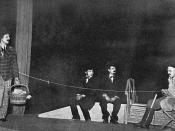Outline
Pinter is undoubtedly one of the most intriguing post-war playwrights. His works are imbued with tension, but an understated tension, one which the audience itself often creates out of its own imaginings. His plays The Homecoming and The Dumb Waiter, but in particular the Dumb Waiter, are indeed a meeting of the Naturalist and Absurdist traditions of drama, combining to form Pinter's own 'Comedy of Menace'. His plays are often tightly controlled, set in single room with few characters, all in fear of an external force that the characters perceive as having an illogical approach to the meting out of justice.
Pinter said that 'I feel a sense of music continually in my writing' and his dialogue often has rhythmical verse, both very much present in the two plays. Yet this belies the underlying tension of the words; the audience knows that what's not being said is as important as what is.
All these factors, combined with the physical staging of the plays, allow Pinter to explore larger themes in the existential manner of the Theatre of the Absurd. It is in these areas of language, staging and setting, characterisation that we can examine the Dumb Waiter, and to a lesser extent The Homecoming, in the context of the Absurdist and Naturalist traditions of theatre. For example's of Absurdist and Naturalist Drama I will use the plays of Henrik Ibsen and Waiting For Godot by Samuel Beckett respectively.
Naturalism and Absurdist Theatre
Both of these types of theatre certainly had an influence on Pinter, and he had conversely an influence on them. Naturalism came into being at approximately the same time of realism and was largely propagated by the French novelist Emile Zola. He believed that scientific methods of discovery could be used within the novel, which he...


